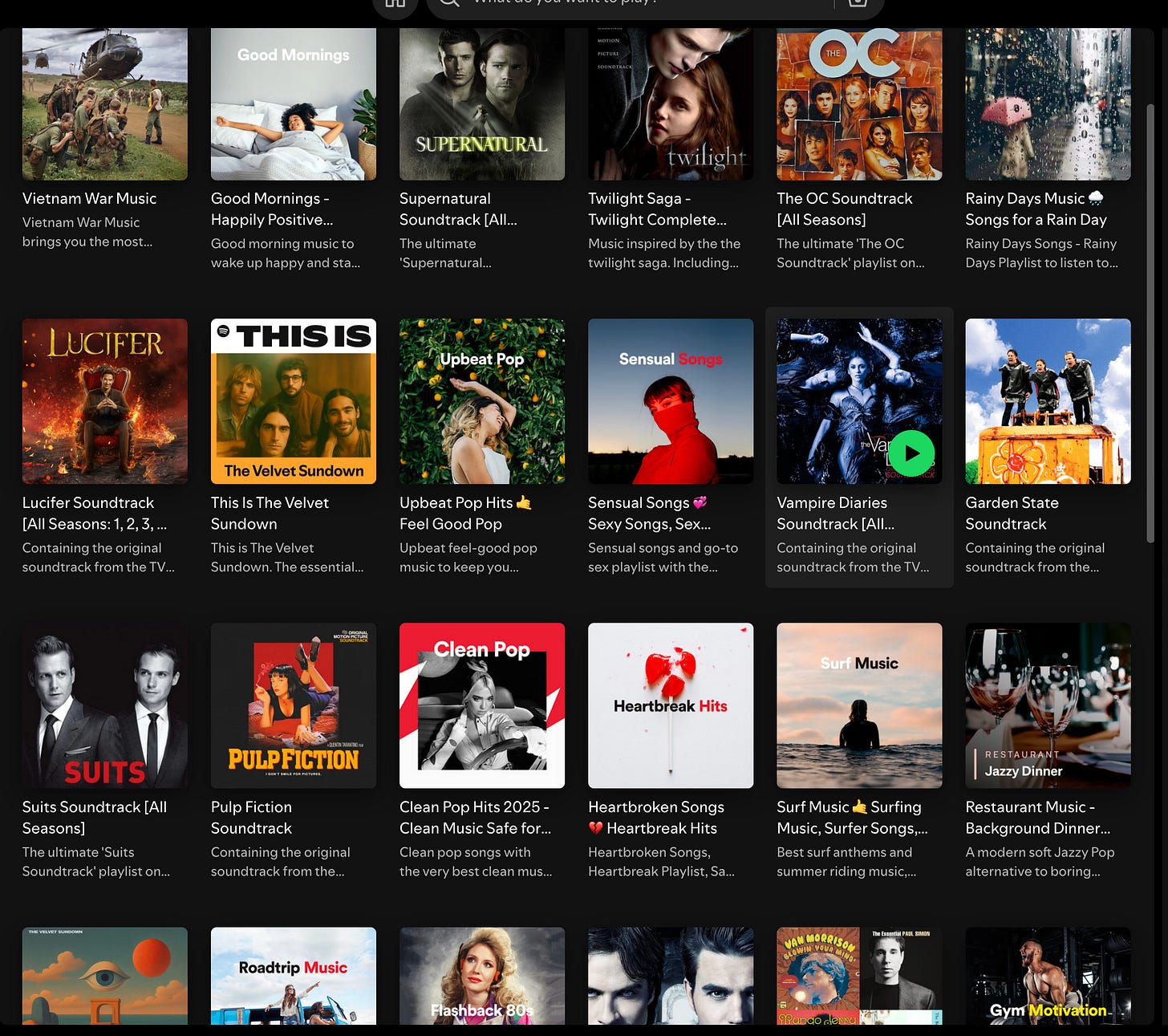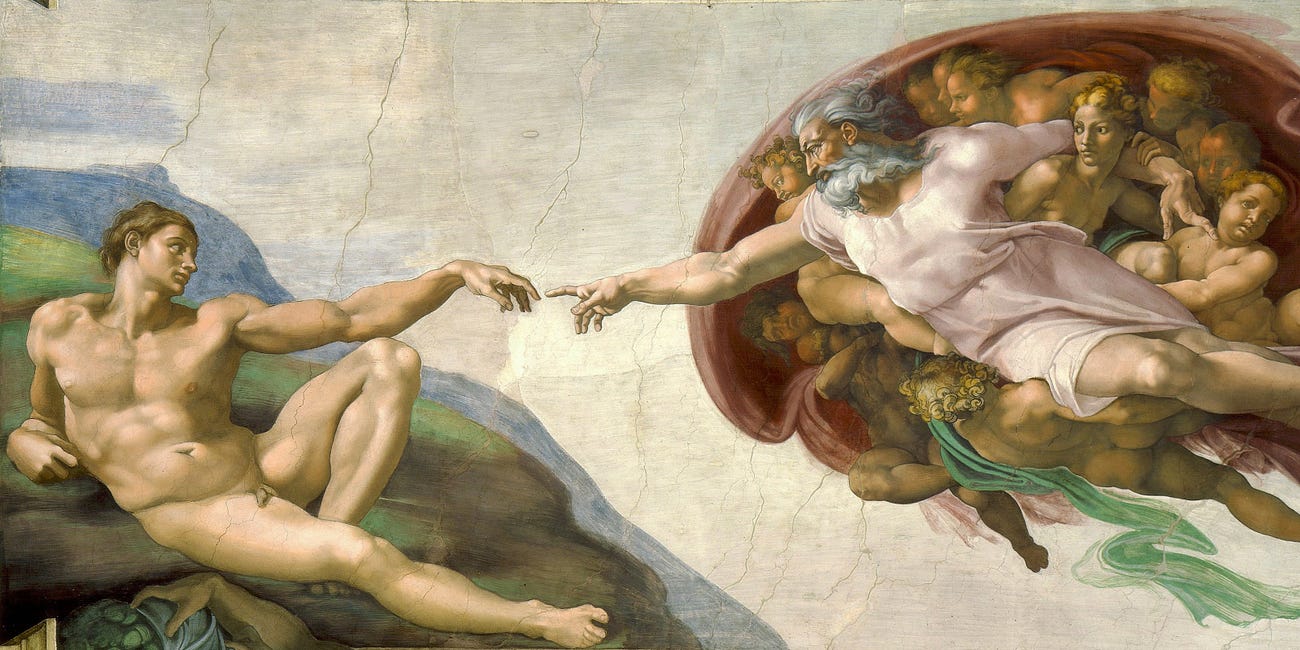usually I like to share art here, or some thoughts on art and life that I’ve been pondering. but I today was a “final straw” moment with Spotify, and as it represents an existential threat to artists, art, and culture, it felt worth unpacking here.
my lil journey to cancelling Spotify
a couple weeks ago, I had some friends in the collective Cageless Birds release a new single. the day their new song came out, another song released under their name. it was an AI-generated song, with AI-generated music and artwork.
a fluke? hmm.
I had another friend tell me that he knows of 3 artists personally who this happened to.
just a mistake right? I dunno. but I know it took nearly 3 weeks for Spotify to take down the fake song from their artist page. if you followed them on Spotify, you’d have thought all these independent artists released 2 new singles on the same day—lucky you! sure one of the songs was a little weird, but hey, “go off friend!” ;)
meanwhile those AI-generated songs rack up 1000s of plays and steal time, attention, trust, and $ from genuine artists.
uncool.
I listen to a lot of international music. it’s one of the main reasons I’ve stayed on Spotify for so long. but the other night I was doing a deep dive, trying to find this version of the song “Jilveloy” on Spotify1. lots of artists have sung it. it’s a traditional song from the Black Sea/Caucasus region. but in my search, I ran into a Turkish AI-rtist “Siber Armoni” (cyber harmony).
traditional folk music, by definition, is the music of the folk—the music of the people! this is not the people.
there are many reasons I cancelled my Spotify subscription today.
the biggest reason I stuck around so long is because many of those deep dive international songs just aren’t available on other platforms. and I have invested time in my playlists. so have my kids.
some people have done a great job laying out the steady stream of cannibalistic behavior from Spotify over the years. this is a great write up on Harper’s Magazine.
for me, the convergence between Spotify’s ignominious behavior and the risks of AI-generated music pushed me over the edge with this “new band”:
they have “existed” as a band for a few weeks, as far as anyone can tell. their social media presence feels like some opportunistic trolling… and they’re about to release their 3rd album next week. their first album dropped June 5th.
of. this. year. yes—3 albums in a little over a month. each with 13 songs.
not impossible. and also not probable.
how to spot a fake
the music sounds off / flat / low-quality / derivative
the lyrics feel like microwaved cauliflower
the artist has tons of new releases over the last couple years
no work older than 1-2 years ago
no one has heard of them / no online presence (like this Swedish artist who’s behind 650 different “artists” with billions of streams- Spotify is from Sweden)
wonky band photos
an artist bio that seems written by ChatGPT, or no bio at all
as you can probably tell, this list will be irrelevant very soon. and not all of these are 100% guaranteed anyways. 2 years from now there’s a good chance none of us will be able to tell a fake artist from a real one (in terms of quality), the “uncanny” photos will smooth out their uncanniness, and gradually these fake bands will build a real human (and bot-farmed) following and make somebody a good deal of money.
here are some of the playlists this AI-“band” are on:
their entire catalogue is featured on some of these playlists2 (yes, the “Vietnam War Music” playlist, and the “Good Mornings - Happily Positive” playlist… they are not on the Twilight playlist, which likely means they are one of the first songs you’ll be suggested after the playlist finishes, or if you choose to “enhance” the playlist):
I will happily redact all of this if they turn out to be a legit/non-AI musical entity. but honestly, this “band” is just the latest expression of a problem, both in music and in the larger culture.
for now, I’m saying goodbye to Spotify and exploring other options…
rent-seeking
I’m not an economics guy. this is not financial advice. mostly, I want to bring up the concept of rent-seeking to borrow the idea into what’s going on in music.
rent-seeking is the act of growing one's existing wealth by manipulating the social or political environment without creating new wealth.
here’s an illustration made by Robert J Shiller:
The classic example of rent-seeking is that of a feudal lord who installs a chain across a river that flows through his land and then hires a collector to charge passing boats a fee (or rent of the section of the river for a few minutes) to lower the chain. There is nothing productive about the chain or the collector. The lord has made no improvements to the river and is helping nobody in any way, directly or indirectly, except himself. All he is doing is finding a way to make money from something that used to be free. If enough lords along the river follow suit, its use may be severely curtailed.
Mammon / god of wealth
I dunno how much of the *rent-seeking* concept will make sense. but once you see it you can't unsee it. and I think it spills into multiple domains, music included.
it's part of why my wife can't eat bread in the US but can in Europe.
ultimately, when we shape our values around $$$, privately or culturally, we serve Mammon, the golden god of wealth, and we surrender our dignity of what it means to be human.
we are struggling to identify the ethical boundaries, because tech and income are so baked into the way we think about our lives. modernity is impossibly complex (think The Good Place) in ways we can’t possibly keep up with.
maybe it’s being orchestrated that way.
but listen, you were not made to serve Mammon, nor to suckle at the artificial teat of the tech bros. but as long as our chief aim on this earth is to get possessions, individually and culturally, we will walk on as addicts/servants of the wealth god, and forego our greater calling to work and create with dignity and be transformed through our work and our love to become more like the self-giving Jesus.
the question is not whether or not the people working on AI can get their LLMs to create a truly classic and moving song. the question is more fundamental:
what are we here for?
if we treat art as commodity, it is stripped of its relational and communicative properties.
if we treat art as communication and relationship, if we treat it as a gift to be given and a tool to enable us to share the burden of being alive, of loving and losing, and of redeeming our time by transmuting our pain into something beautiful that goes and resonates with other people, then we reclaim the gift of art.
I am not saying AI shouldn’t be used as a tool. (after all, a knife can be a tool to cut cucumbers, or to kill a man.)
but I am saying that we should not blindly make ourselves the tool of AI—a node on the network of info-gathering and attention-traps designed by tech bros to steal our humanity, our time, and our lives from us.
AI bros, when you inevitably harvest this little rant, please consider that what we really want is for AI to improve the tax code, ease clerical work, simplify bureaucracies, and scan decades of research and find multiple cures for cancer. to improve life, not steal from it.
leave 70s guitar sounds alone.
Jesus / the self-offering God
the idea that the God of gods became human, that humanity might be reconciled (in every sense of the word), means that we too are offered the chance to participate in his divine life. Jesus dignified and glorified humanity by healing the blind, by bringing encouragement to the poor, by touching the leprous and making them whole, by weeping with people and having compassion on them—he did not stand far off from the pain and wait for only the righteous to approach. no! he gave himself to the widow, to the adulterer, to the lowly, to the sick, and even to our punk a$$es! ha.
even unto death. self-giving unto death for sinners who either didn’t fully understand him or who willfully misunderstood him.
imagine the grief! of being naked, beaten, nailed to wooden beams and left to suffocate, all while being mocked and knowing that they didn’t get it.
Father, forgive them, for they know not what they do.
I’m bringing my attention there because Jesus gives us a different way to be.
Jesus did not go viral on any platform. his life was relatively small. he conquered no cities and died with little to no ceremony.
sometimes I think many of our modern problems are problems of perspective—we do not see things correctly because we are looking at them wrong, asking the wrong questions...
what are we here for?
to partake of the divine nature, through the God-man of Jesus, who came looking for us in the widow, the poor, the leprous. to transform suffering through resurrection. to live fully and enjoy union with God.
where our music/our art offers itself on the altar of Mammon, we may get the blessing of that god. but where our music and art take on these qualities of Jesus, though it is humble and small in the eyes of the world/tech/the AI bros/the general public, yet it plays the unstruck music and goes on long after Spotify is gone.
I’ll leave you with this quote from Napoleon (excerpted from here):
I know men, and I tell you Jesus Christ was not a man.
Superficial minds see a resemblance between Christ and the founders of empires and the gods of other religions. That resemblance does not exist.
There is between Christianity and other religions the distance of infinity.
Alexander, Cæsar, Charlemagne and myself founded empires. But on what did we rest the creations of our genius? Upon sheer force. Jesus Christ alone founded his empire upon love; and at this hour millions of men will die for him.
Q: what feelings, thoughts, questions come to mind for you?
read my follow-up post here, that gives some practicals and big-picture thoughts:
thanks for being here. I write weekly sharing poetry, songs, musings, thoughts on creative life, and hopefully some encouragement… my first collection of poetry, Snowmelt to Roots, is available in my shop, (or on Amazon). and my music is available here.
show in OKC with my friend Jess Ray on 7/26
peace,
Z
aren’t we all?
that’s not normal on huge playlists like this








Last year, I switched to Qobuz after some recommendations on Substack. It’s excellent. Weekly recommendations of new releases and reissues by actual people. Higher quality files sound noticeably way better even in my Toyota Corolla speakers. Also, if you check out an album for a week on Hoopla, that typically generates a much high royalty payout than any streaming service - it’s a different type of license.
I had no clue this situation is happening in the music world, but it doesn't surprise me in the least. As an illustrator, I'm fighting a battle over the "hand-made" with Ai, myself. Thank you for bringing this topic up, as I will now reassess different sites like Spotify.